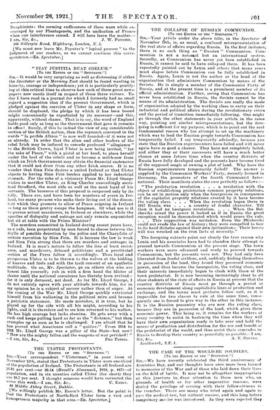"FIAT JUSTITIA RUAT COELUM."
[To THE EDITOR OP THE " SPECTATOR."] would be very surprising as well as distressing if either the Spectator or the Morning Post should be found wanting in honesty, courage or independence; yet it is particularly gratify- ing at this critical time to observe how each of these great news- papers now excels itself in respect of those three virtues. To- day I have read in a journal for which I formerly had no small regard a suggestion that if the present Government, which is pledged against the coercion of Ulster in any shape or form, should be displaced, the pledge by which it has been bound might conveniently be repudiated by its successor—and this, apparently, without shame. That is to say, the word of England holds good only so long as the Government that gave it remains in office! Surely, if this be indeed the view of any considerable section of the British nation, then the reproach conveyed in the words "la perfide Albion " is now well founded—if it were not so already. In order that the alien and other leaders of the rebel Irish may be induced to concede professed " allegiance " to the British Crown, loyal Ulster is now being invited, " for the sake of Peace," with a pistol at her head, to place herself under the heel of the rebels and to become a mulch-cow from which an Irish Government may obtain the financial sustenance that it could not draw from any other Irish. source. It is no wonder that Sinn Fein desires a united Ireland or that Ulster objects to having Sinn Fein leeches applied to her industrial stomach. For the sake of a visionary Peace Mr. Lloyd George wishes to sacrifice Ulster, as King Charles unavailingly sacri- ficed Strafford, the most able as well as the most loyal of his servants. The baseness of this proposal is surpassed only by its folly. There are, and have been for numbers of years in Ire- land, too many persons who make their living out of the discon- tent which they promote to allow of Peace reigning in Ireland so long as these gentry escape the hangman. Of what use is it to pursue actual murderers, in Ireland or elsewhere, while the apostles of disloyalty and outrage not only remain unpunished but sit at table with the Prime Minister?
The murders committed in Ireland during recent years have,
as a rule, been perpetrated by men forced to choose between the Scylla of possible detection by the police and the Charyi.dis of certain execution by Sinn Fein. It is because the law is weak and Sinn Fein strong that there are murders and outrages in Ireland. It is man's nature to follow the line of least resist- ance, and murderers, debased politicians and a prostituted section of the Press follow it accordingly. Thus loyal and prosperous Ulster is to be thrown to the wolves at the bidding of knaves and fouls and with the tacit consent of an apathetic multitude. Go on, Mr. Spectator, go on others also who are honest like yourself; rub in with a firm hand the blister of shame until the national conscience has thereby been revived— for it is only dormant, not dead. As for Mr. Lloyd George, I do not entirely agree with your attitude towards him, for in my opinion he is a subject of sorrow rather than of anger. At the coming of the War Mr. Lloyd George quickly extricated himself from his wallowing in the political mire and became a patriotic statesman. He made mistakes, it is true, but he played up for the side with all his might, according to his lights, and it is therefore sad to see him returned to his wallow. He has high courage but lacks stamina. Ile gets away with a rush and keeps pulling hard as far as the "distance," but then crumples up as soon as he is challenged. I am afraid that he has proved what Americans call a " quitter." From 1914 to 1918 Mr. Lloyd George was a pillar of the State—but now? "How are the mighty fallen and the weapons of war perished! "










































 Previous page
Previous page